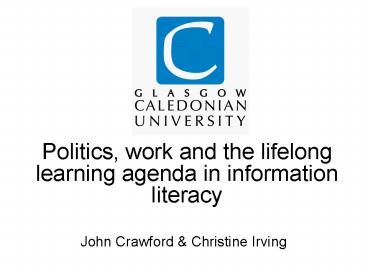Politics, work and the lifelong learning agenda in information literacy - PowerPoint PPT Presentation
1 / 17
Title:
Politics, work and the lifelong learning agenda in information literacy
Description:
We need a lot more lobbying on the importance of IL on the political front, with ... Ken Mackintosh (MSP) asked questions in the Scottish Parliament ... – PowerPoint PPT presentation
Number of Views:42
Avg rating:3.0/5.0
Title: Politics, work and the lifelong learning agenda in information literacy
1
- Politics, work and the lifelong learning agenda
in information literacy
John Crawford Christine Irving
2
Christine Bruce
- We need a lot more lobbying on the importance of
IL on the political front, with industry, with
very senior people.People need to concentrate on
finding out who we should lobby and who should do
the lobbying. We need people with political and
marketing skills - Update, Jan/Feb. 06. p. 43
3
Scotland as a laboratory for research in
information literacy
- The Lifelong Learning Strategy for Scotland a
peg to hang IL on http//www.scotland.gov.uk/libra
ry5/lifelong/llsm-00.asp - The second least socially divisive educational
system in the world Scotsman, 25/1/06,
http//thescotsman.scotsman.com/index.cfm?id12005
2006 - Over 50 of the eligible population continue from
school to university, making strategies which
link the secondary and the tertiary sectors
feasible - Organisation of the school system is both simple
and uniform - Scottish Executive e-government policy
4
Influencing government policy?
- Skills, getting on in business, getting on at
work (Great Britain. Department for Education and
Skills 2005. vol. 1. pp.1,) emphasises the need
for a skilled workforce but only ICT skills are
specifically mentioned - Consultation Review of Scottish Digital
inclusion Policy http//www.scotland.gov.uk/Public
ations/2005/11/04103500/35010 - Mentions only ICT skills but evidence to
consultation submitted by SLIC Christine and me
highlight IL
5
Politics in small nations
- Small countries, small minds, petty corruption?
- Or easier access to the decision making
process?
6
Public Petitions
- Public Petitions Committee may invite
petitioners to speak - Any individual, group or organisation may
petition the Parliament - Speak to your MSP first
- A petition can ask the Public Petitions Committee
to take a view on a matter of wide public
interest or concern - Or ask the Public Petitions Committee to amend
existing legislation or introduce new legislation
7
Petitions and e-government
- A petition can be hosted on the Parliament's
website for an agreed period - an opportunity to attract a much wider audience
and gather more names in support of the petition - Signatures welcomed from outside Scotland
- Each e-petition has its own discussion forum,
where visitors and supporters can discuss and
debate the petition - After agreed period presented to Petitions
Committee in usual way - Not many comparators (Bundestag)
8
An inclusive process
9
What we did
- Submitted petition electronically late October
2005 - Publicised on elists
- Attracted 710 signatures worldwide
- Wrote to the Scottish press
- Ken Mackintosh (MSP) asked questions in the
Scottish Parliament - Attended committee to present petition
10
(No Transcript)
11
(No Transcript)
12
Outcomes
- Very favourable reaction from the profession and
professional media otherwise zilch - Petitions Committee wrote to the Scottish
Executive, a range of NGOs and unions - Other interested bodies subsequently submitted
evidence
13
And so?
- To return to the policy issue What are you going
to do about it?
14
The role of information literacy in the work
environment
- follows on a study (Crawford 2006) which
highlighted the importance of information
literacy in the workplace. - interviews with people in the work situation to
understand better the role of information
literacy in the work place and how this varies in
different working environments. - subjects for interview were drawn from
- trade union learning representatives contacted
through the Scottish Centre for Work Based
Learning - personal contacts.
15
Areas covered
- The work they do, their experience and
qualifications - Skills needed for work
- Learning in the workplace
- Information Skills / Information Literacy Skills
- Knowledge Management
16
Outcomes of the interviews
- general impressions so far
- to assist in the formulation of more precise
questions to facilitate further research.
17
- John Crawford jcr_at_gcal.ac.uk
- Christine Irving christine.irving_at_gcal.ac.uk
- Project website www.learningservices.gcal.ac.uk/il
s/index.html































